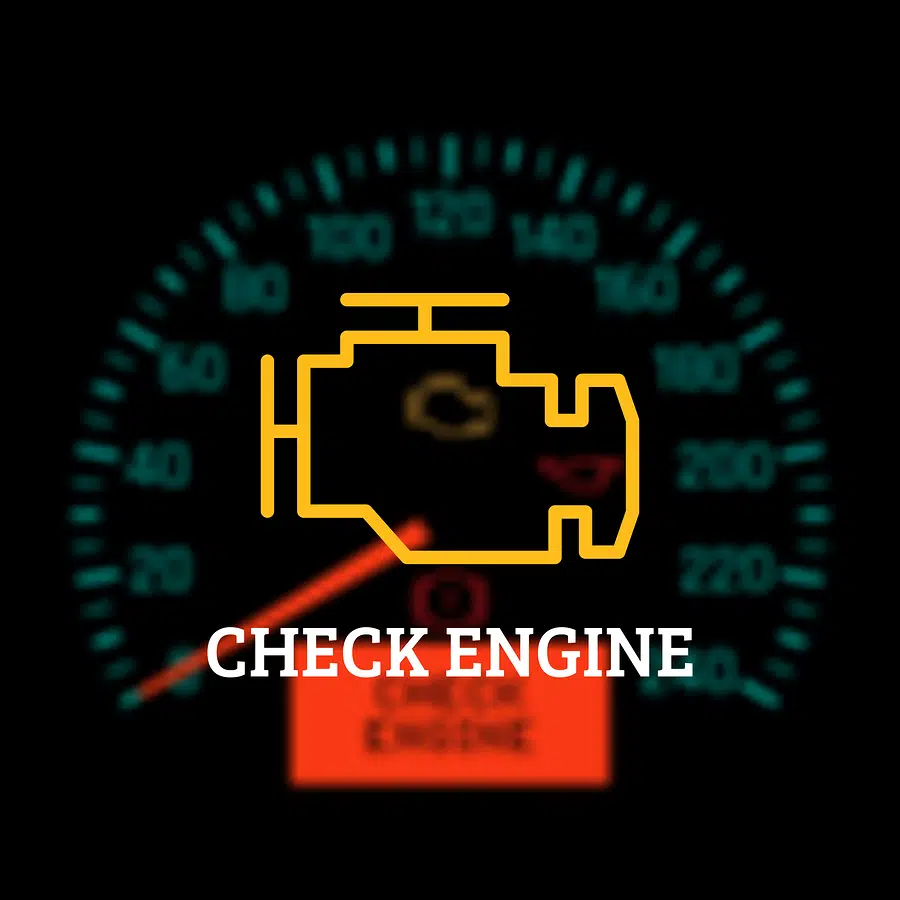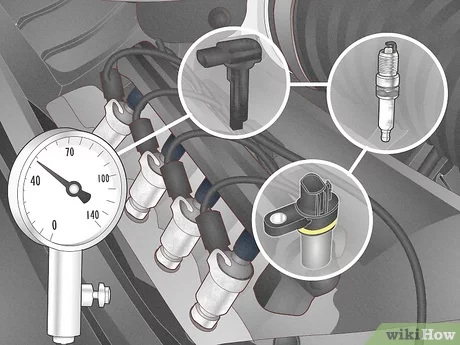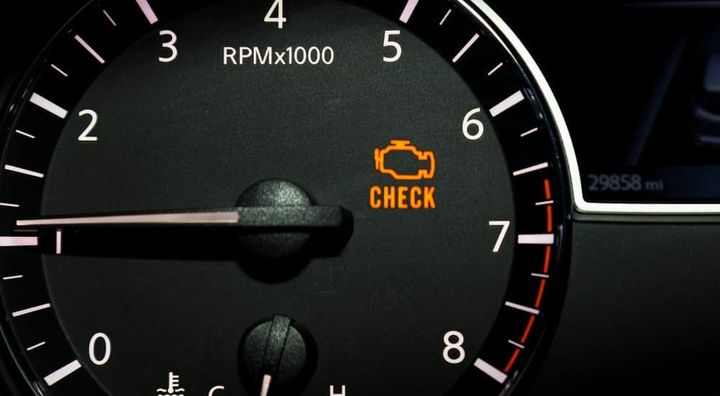


The check engine light is an essential component of a vehicle's onboard diagnostics system, designed to alert the driver of potential issues within the engine or related systems. Its behavior and illumination pattern can provide valuable insights into the severity of the underlying problem.

The check engine light is a crucial component of your vehicle's onboard diagnostic system. It's designed to alert you when there's a problem with the engine or one of its related systems. When the light is steadily illuminated, it typically indicates a minor issue that can be addressed during your next scheduled maintenance. However, when the light starts flashing, it's a different story altogether.
A flashing check engine light is a clear indication that a serious problem has been detected, and it requires immediate attention. Ignoring this warning can lead to further damage and potentially costly repairs down the line.
Over the years, I've encountered various reasons why a check engine light might start flashing. Here are some of the most common culprits:
| Cause | Description |
|---|---|
| Engine Misfire | One of the primary reasons for a flashing check engine light is an engine misfire. This occurs when one or more cylinders fail to fire properly, leading to an imbalance in the air-fuel mixture. It can be caused by a variety of issues, such as faulty spark plugs, ignition coils, fuel delivery problems, compression issues, or even a timing belt failure. |
| Loose or Faulty Gas Cap | Believe it or not, something as simple as a loose or damaged gas cap can trigger the check engine light to flash. This is because an unsealed fuel system can cause evaporative emissions issues, which the engine control module (ECM) will detect and flag as a potential problem. |
| Catalytic Converter Issues | The catalytic converter is a crucial component of your vehicle's exhaust system, responsible for reducing harmful emissions. If it becomes clogged or damaged, unburned fuel can enter the exhaust system, causing the ECM to detect a misfire and activate the flashing check engine light. |
| Oxygen Sensor Failure | Oxygen sensors play a vital role in monitoring the air-fuel mixture in your engine. If one or more of these sensors fail, it can lead to an improper air-fuel ratio, causing misfires and triggering the check engine light to flash. |
When a customer comes to me with a flashing check engine light, my first step is to diagnose the root cause of the problem. Here's how I approach the situation:
Scan for Diagnostic Trouble Codes (DTCs)
Check for Symptoms
Inspect Components
Modern vehicles are equipped with an OBD-II (On-Board Diagnostics) system, which stores diagnostic trouble codes (DTCs) related to various issues. By connecting an OBD-II scanner to the vehicle's diagnostic port, I can retrieve these codes, which provide valuable information about the specific problem at hand.

While the DTCs can point me in the right direction, I also pay close attention to any additional symptoms the vehicle might be exhibiting. These can include:
Engine knocking noises
Poor acceleration
Reduced fuel efficiency
Visible smoke from the exhaust
These symptoms can help me narrow down the potential causes and make a more accurate diagnosis.
Based on the DTCs and symptoms, I'll inspect the relevant components that could be causing the issue. This might involve checking:
Spark plugs
Ignition coils
Fuel system components
Catalytic converter
Oxygen sensors
Once I've identified the root cause of the flashing check engine light, it's time to address the issue. The repair process will vary depending on the specific problem, but here are some common scenarios:
| Repair | Description |
|---|---|
| Engine Misfire Repairs | If the issue is related to an engine misfire, I'll replace the faulty spark plugs, ignition coils, fuel injectors, or address any compression issues as needed. This might involve replacing piston rings, valves, or even the timing belt in severe cases. |
| Loose Gas Cap | If the culprit is a loose or damaged gas cap, the solution is simple – tighten or replace the gas cap. |
| Catalytic Converter Replacement | If the catalytic converter is clogged or damaged, it will need to be replaced. This is a more significant repair, but it's essential to address it promptly to prevent further damage to the engine and exhaust system. |
| Oxygen Sensor Replacement | Faulty oxygen sensors will need to be replaced to ensure proper air-fuel mixture monitoring and engine performance. |
Throughout the repair process, I follow the manufacturer's recommended procedures and use the correct tools and replacement parts. After completing the repairs, I'll clear the DTCs using the OBD-II scanner and perform a test drive to ensure the issue has been resolved.
While addressing the immediate issue is crucial, I also emphasize the importance of preventive maintenance to my customers. Here are some tips I typically share:
Follow the Recommended Maintenance Schedule
Regular oil changes
Air filter replacements
Spark plug replacements at recommended intervals
Tighten the Gas Cap Properly
Avoid Aggressive Driving and Overloading
Address Issues Promptly
One of the most common concerns I hear from customers is the potential cost of repairs. While the cost can vary depending on the specific issue and the make and model of the vehicle, here are some estimated costs for common repairs:
| Repair | Cost Range |
|---|---|
| Spark Plugs | $2 - $100 per plug |
| Ignition Coils | $100 - $400 each |
| Fuel Injectors | $200 - $1,000 per injector |
| Catalytic Converter | $1,500 - $3,500 |
| Oxygen Sensors | $200 - $500 each |
Additionally, most repair shops charge a diagnostic fee ranging from $80 to $120.
While these costs might seem daunting, it's important to remember that addressing the issue promptly can prevent further damage and more expensive repairs in the long run. Regular maintenance and addressing issues as they arise can help ensure the longevity of your vehicle and potentially save you money in the long term.
As a mechanic, I've seen firsthand the stress and anxiety that a flashing check engine light can cause for vehicle owners. However, with the right knowledge and approach, it's a problem that can be resolved. By understanding the common causes, properly diagnosing the issue, and addressing it promptly, you can keep your vehicle running smoothly and avoid more significant problems down the road.
Remember, preventive maintenance and addressing issues promptly are key to ensuring the longevity of your vehicle. Don't ignore warning signs, and always seek professional assistance when needed. With the right care and attention, your vehicle can continue to serve you reliably for years to come.
A steady check engine light typically indicates a minor issue, while a flashing light signifies a serious problem that requires immediate attention.
Yes, a faulty oxygen sensor or other related sensors can trigger the check engine light to flash, indicating an issue with the air-fuel mixture or emissions.
No, it is not recommended to continue driving with a flashing check engine light, as it can lead to further damage and potentially costly repairs.
Oxygen sensors should be replaced according to the manufacturer's recommended maintenance schedule, typically every 60,000 to 90,000 miles.
Yes, a loose or corroded battery connection can potentially cause electrical issues that may trigger the check engine light to flash.
Yes, software glitches or outdated firmware in the engine control module (ECM) can sometimes cause the check engine light to flash erroneously.
In some cases, transmission problems or issues with the transmission control module (TCM) can trigger the check engine light to flash.
Not necessarily. A flashing check engine light related to the catalytic converter could be caused by other issues, such as misfires or faulty oxygen sensors.
Yes, a vacuum leak in the engine's intake system can disrupt the air-fuel mixture and potentially cause the check engine light to flash.
Yes, faulty wiring or electrical connections related to the engine control system can sometimes trigger the check engine light to flash.

Sarah isn't your average gearhead. With a double major in Mechanical Engineering and Automotive Technology, she dived straight into the world of car repair. After 15 years of turning wrenches at dealerships and independent shops, Sarah joined MICDOT to share her expertise and passion for making cars run like new. Her in-depth knowledge and knack for explaining complex issues in simple terms make her a valuable asset to our team.













